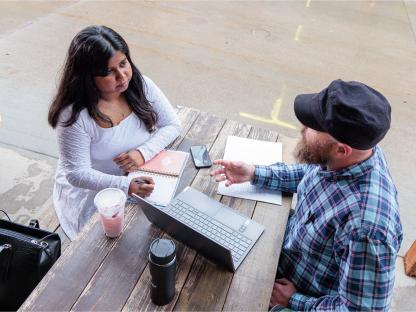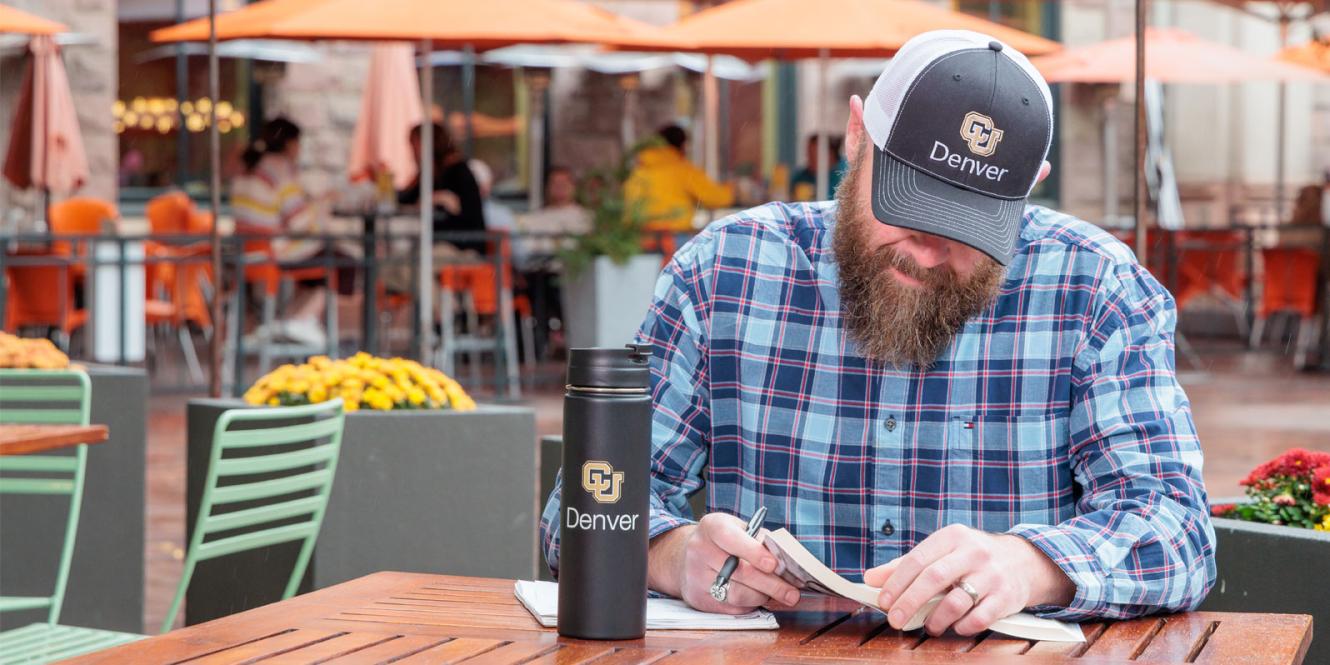
Major in Sociology (Bachelor’s)
Explore the dynamics of human society and gain a profound understanding of social issues with CU Denver’s online Sociology degree.
The online BA in Sociology helps you build skills to analyze and address social problems impacting communities worldwide.
- Understand social relations, institutions, and cultural processes.
- Develop critical thinking, research, and communication skills applicable to diverse industries.
- Fully online and asynchronous, offering flexibility for working professionals.
- Learn from expert faculty delivering the same high-quality curriculum as on-campus students.
-
Degree LevelBachelor’s
-
School & CollegeCollege of Liberal Arts and Sciences
-
Total Credit Hours120
-
Class Type100% Online
-
Time CommitmentFull-Time or Part-Time
-
Start Term(s)Fall, Spring, Summer
- Fill out form
- We'll be in touch soon
- Get ready to meet your moment
Program Overview
The 120-credit-hour fully online Bachelor of Arts in Sociology focuses on social relations, interactions, and institutions. Its core courses will give you an introduction to topics like inequality, criminal deviance, sex and gender, self and identities, and more.
Analyze the problems facing modern society. Examine the perspectives and systems impacting child welfare, community development, healthcare, and government agencies. Learn to advocate for people and bring positive change to your community. While you build important soft skills such as critical thinking, communication, and time management, this sociology program also helps you apply theories, concepts, and research methods to real-world jobs, both within social work and in the greater marketplace.

The knowledge and skills you will build are widely applicable to many industries and occupational settings, and you’ll be prepared to transition into a master’s program should you choose.
Many industries can benefit from the study of social behavior, human groups, and social institutions, and you can maximize your time by applying what you learn to your current job setting.
The BA in Sociology program is taught by faculty from our Denver campus. That means you’re receiving the same high-quality curriculum and instruction as students on campus. It is also offered asynchronously, meaning there are no set sign-in times, and you can complete your coursework at the best time of day and place for you.
Tuition Breakdown
| Resident | Non-Resident |
|---|---|
| $403* per credit | $623 per credit |
*College Opportunity Fund (COF) must be elected for this rate.
Example Courses
The BA in Sociology requires 120 credits, 32 of which come from required sociology courses. The remainder of the coursework comes from CU Denver requirements, including mathematics and writing competencies. Of the 32 sociology credits, at least 16 must be in upper-division, 3000- or 4000-level courses. In order to graduate with a BA, students must earn a cumulative GPA of 2.0 in their sociology courses.
Juvenile Delinquency (SOCY 4340)
Explore factors in delinquent behavior, adjustment challenges, and treatment. Study key theories like strain, social learning, control, and labeling, plus methods for testing them.
Poverty and Social Inequality (SOCY 4440)
Examine the distribution of wealth, income, and power in the U.S., focusing on social institutions and factors that shape economic inequality.
Crime, Justice, and the City (SOCY 4590)
Analyze how crime, policing, and incarceration vary by neighborhood. Explore segregation, gentrification, and spatial analysis in criminal justice using mapping and research methods.
Required Courses
The following courses are required. In addition, students will choose from 12 credit hours of elective courses.
| Course Number | Course Name |
|---|---|
| SOCY 1001 | Understanding the Social World (previously Introduction to Sociology) (3 credits) |
| SOCY 2001 | Inequalities in the Social World (3 credits) |
| SOCY 3119 | Qualitative Methods (4 credits) |
| SOCY 3115 | Quantitative Methods & Analysis (4 credits) |
| SOCY 3140 | Sociological Theory (3 credits) |
| SOCY 4830 | Senior Capstone: Worklife Practices & Policies (3 credits) |

Sociology Degree Specializations
The BA in Sociology courses cover the basics of sociology as well as a number of focal areas. Students can also choose to complete one of five specialized paths based on their interests or career plans:
- Crime, Law, and Justice
- Health and Medicine
- Families and Social Welfare
- Diversity, Equity, and Inclusion
- Sociology, Gender, and Society (Concentration includes some coursework that is in-person only.)
Award of concentration is noted on the student’s transcript immediately upon its completion, even if the student is still working toward the BA degree.
Career Outlook
What can I do with a bachelor’s in sociology?
Sociology graduates can find career opportunities in a wide variety of industries and positions. Some graduates enter private practice as social workers with a specialty, such as substance abuse. Others choose to work for a company or state department as a case manager, family services worker, activity director, or another similar role. A sociology degree can also prepare you to pursue positions such as:
- College or high school teacher
- Policy analyst
- Demographer
- Survey researcher
- Statistician
With knowledge and skills in criminology, sociology graduates can also take on positions working to analyze systems and populations in order to understand and reduce crime. Here are some general career paths for graduates with a bachelor’s degree in sociology:
- Social Welfare
- Government
- Teaching
- Social Science Research
- Public Relations
- Criminal Justice
- Healthcare
- Human Resources and Business Entities
- Veterans Services
Note that some career paths may require additional training, certification, or education to qualify for practice.

Admission Requirements
CU Denver’s College of Liberal Arts and Sciences (CLAS) admissions requirements vary depending on your status as a first-time college student (freshman) or a transfer student.
Learn more about the online sociology program admissions process by contacting our Enrollment Team today.

Get Personalized Support for Your Application
As you consider an online education, we understand that it’s important for you to know that you’re getting a high-quality, affordable, and flexible online education that helps you reach your goals. That’s why the CU Denver Enrollment Team is available to offer guidance and answer any questions that you may have about our degree programs, financial aid options, transfer information, admissions requirements, and more.
Whether you want to talk through your degree plans, learn more about a specific program, or start your application, the CU Denver Enrollment Team will provide friendly support as you decide if CU Denver is the right fit for your future.
Testimonial
Frequently Asked Questions
Sociology graduates acquire competencies in research and data analysis, oral and written communication skills, social and cultural diversity, social problems, and team building skills. Sociology offers a great deal of professional flexibility for graduates. Undergraduate sociology programs produce well-rounded professionals who are ready to engage in several career paths, including graduate school.
Students come to our sociology program with many different career goals, and our program is well-equipped to help graduates pursue their aspirations. The online program offers a great deal of flexibility, and the ideal student will be detail-oriented, organized, and self-motivated to complete the coursework on their own.
CU Denver’s BA in Sociology can be completed at the same pace as any traditional undergraduate degree or at your own pace. That means a student with a full course load can expect to graduate in four years or sooner if they add Maymester and summer courses.
Many students choose to go on to graduate school to earn their Master of Social Work (MSW) in order to work in a clinical setting, or they may choose a different area of study. A Master of Social Work is required in order to become a Licensed Clinical Social Worker (LCSW) or Licensed Master Social Worker (LMSW).
Online learning offers the flexibility to study whenever and wherever you want. You can choose a pace that’s sustainable for your lifestyle, taking into account your current career, family, and other commitments outside of school.
Additionally, our online programs are taught by the same faculty who teach on campus, which means you’re earning the same high quality degree as students on campus, and your diploma will not mention that your degree was earned online.

Tuition & Financial Aid
At CU Denver, we strive to keep our tuition costs affordable so that you can get a world-class education that fits your budget. When you earn a degree, you’re not simply getting a diploma — you’re making a lifelong investment in yourself and empowering your future career. We know that affordability is an important factor, and that’s why we’re here to help you explore all of the options available to fund your education.
Application fees can vary based on the program, but there is typically a small fee required upon submission of your application. Please reach out to an Enrollment Navigator for more information about any costs associated with your application.
You may be eligible to pursue scholarships intended for sociology students, such as the WJS Keep On Truckin’ Scholarship, the Ronna T. Winterton Scholarship, and other financial assistance opportunities.

Completion Time
One of the main benefits of an exclusively online education is flexibility. You can take as many classes as you can fit into your schedule and complete the program at your speed. Though you can complete many of our undergraduate degrees in four years by taking a full course load, you also have the option of taking fewer credits and completing the program over more time.
After graduation, you’ll be able to immediately go to work in sociology-related fields.

Continuing Your Education After a Bachelor’s in Sociology
After graduation, you can continue your education with an advanced degree in social work (Master of Social Work), which is required in order to become a Licensed Clinical Social Worker (LCSW) or a Licensed Master Social Worker (LMSW). Some leadership positions may also require a minimum of a Master of Social Work. The University of Colorado’s graduate programs can help you take steps toward an advanced career and impactful social work practice.
Experience flexible, career-focused programs with CU Denver’s renowned quality—100% online—taught by expert faculty in engaging courses within a supportive community, all at an affordable tuition with financial aid and scholarships available.

Flexible, career-focused programs with the same CU Denver quality—100% online.

Expert faculty, engaging courses, and a supportive online community.

Affordable tuition with financial aid and scholarships for online students.

Take the Next Step
Ready to make a difference in society? Take the first step toward earning your online degree by calling us at 303-860-5604 or filling out the form above for more information.




